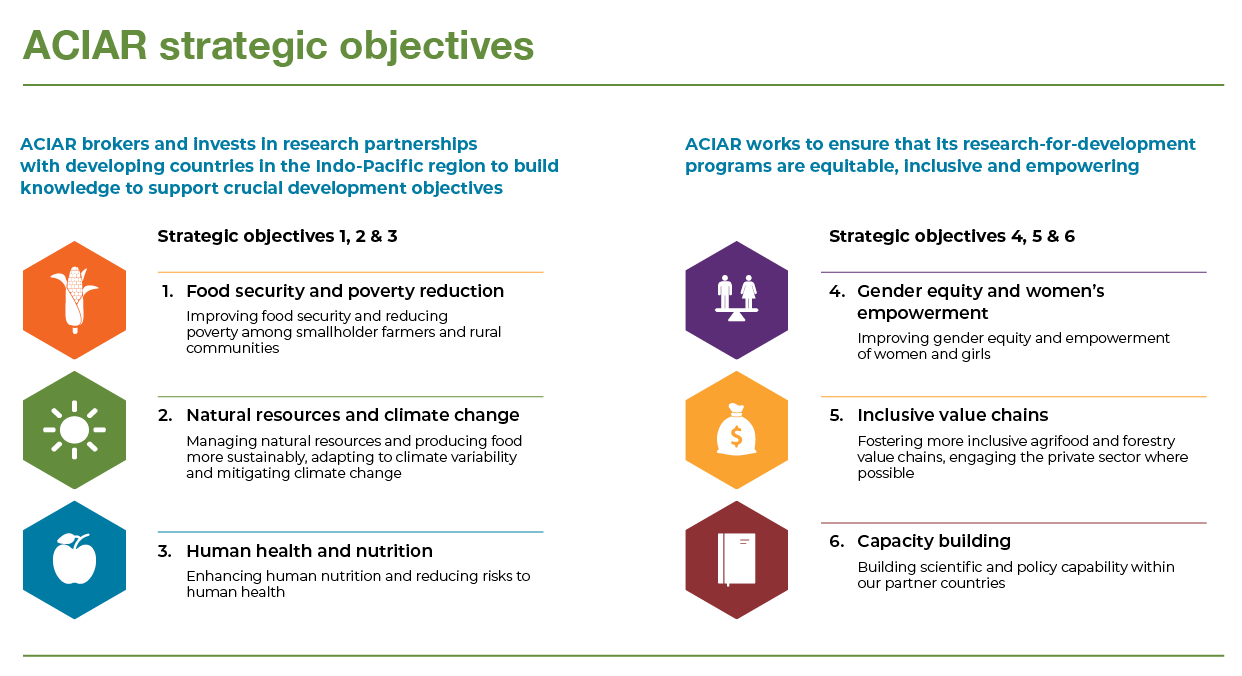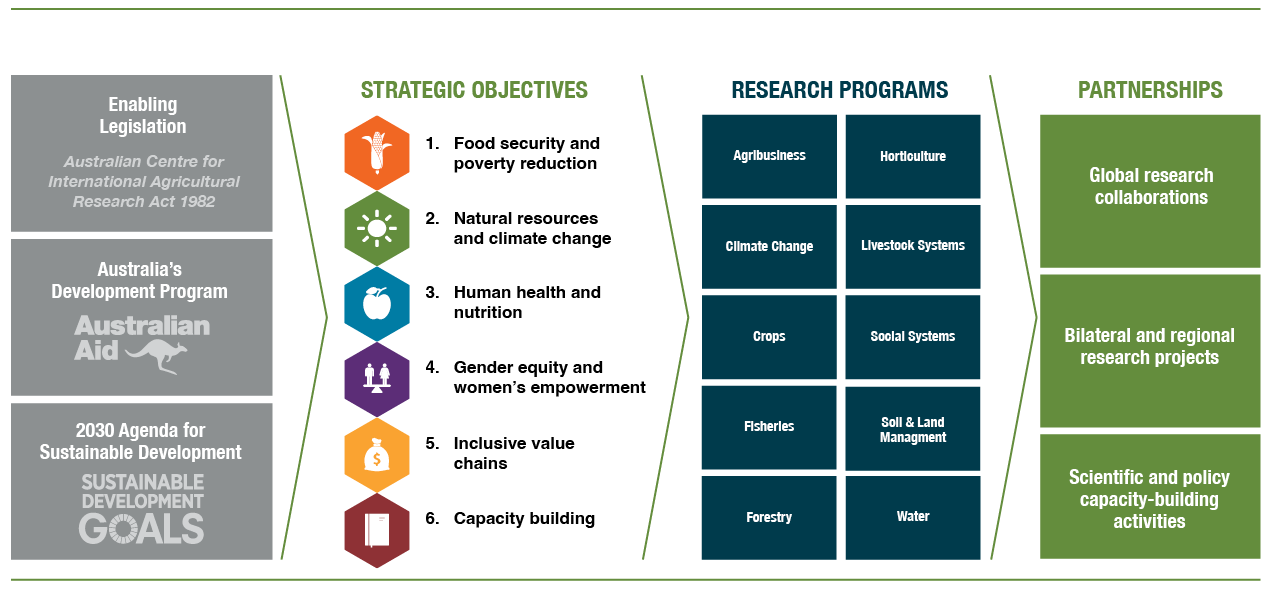Food security and poverty reduction
The strategic objective to improve food security and reduce poverty among smallholder farmers and rural communities is central to the purpose, vision and mission of ACIAR.
Our research portfolio supports innovation in agriculture, fisheries and forestry systems to increase production efficiency and product quality, as well as the profitability, sustainability and resilience of the systems. This not only provides more-nutritious food for smallholder farmers and their families and communities, but also enables the production of marketable surplus to improve livelihoods.
Investment and innovation in food systems increases the resilience of farmers, communities and science agencies in the face of ongoing and future disruptions such as natural disasters, civil unrest and global pandemics.
During 2023–24, ACIAR will support the development of more-resilient food production systems through global collaboration, investment in partnerships and facilitation of capacity-building opportunities. We will continue our collaboration with Canada’s International Development Research Centre to deliver the Food Loss Research Program. We will continue to investment in regional and bilateral projects to develop climate-resilient, innovative, sustainable and profitable food value chains. Our Capacity Building Program enables partner country scientists to develop scientific and leadership skills to contribute to food systems resilience.
ACIAR projects improving food systems in 2023–24 include:
|
Natural resources and climate change
Managing natural resources and producing food more sustainably, adapting to climate variability and mitigating climate change, the focus of our second research-based objective, is fundamental to the livelihoods of smallholder farmers, fishers and foresters in the Indo-Pacific region. Many countries experience a degraded natural resource base, such as poor soil health and water quality, and these issues are increasingly amplified by the growing impact of a changing climate.
Many projects across the ACIAR research portfolio address elements of this objective. In particular, the ACIAR Climate Change Program brokers research to progress the science and practice of transforming food systems and livelihoods that are most under pressure to adapt or reduce greenhouse gas emissions.
The year ahead presents several opportunities to contribute and influence global discussions on food security and climate change. ACIAR plans to share tangible examples of game-changing Australian innovation and investment that, with the right partnerships in place, can be scaled for significant impact globally.
ACIAR will continue to represent Australia in collaborations with international partners through the Adaptation Research Alliance, which aims to increase investment and opportunities for action-orientated research to inform effective climate change adaptation, particularly for vulnerable countries and communities.
ACIAR projects supporting climate change adaptation and mitigation in 2023–24 include:
|
Human health and nutrition
Better nutrition, food safety and food security are priority concerns in our partner countries, and therefore fundamental elements of the research and programs supported by ACIAR and its partners.
Throughout the Indo-Pacific region, countries, provinces and communities are experiencing the triple burden of nutrition – acute hunger and malnutrition alongside increasing levels of obesity and diet-associated diseases. Higher incomes and urbanisation have led quickly to obesity and a rise in the incidence of non-communicable diseases. In many cases these are affecting previously under-nourished communities.
With greater awareness of the potential impact of zoonotic disease, the safety of food systems is under scrutiny. During 2023–24, ACIAR will support a program of One Health projects in partnership with Canada’s International Development Research Centre (IDRC), and led by in-country science partners. Focused on the interface between human, animal and environmental health, the program aims to support the continued operationalisation of One Health.
Leaders in agriculture, business, science and government recognise that if the UN Sustainable Development Goals are to be achieved by 2030, there must be a global transformation in how food is produced, processed, distributed and consumed. Many projects in our research portfolio are designed with an element of enhancing human nutrition and reducing risks to human health. During 2023–24, ACIAR will continue to develop partnerships and broker research relationships that address the many factors that influence the nutritional value of food harvested and the safety of the food production system.
ACIAR projects supporting healthier food systems in 2023–24 include:
|
Gender equity and women’s empowerment
Gender equity is crucial to alleviating poverty in rural communities and a key consideration in all contexts in which ACIAR operates. As more than half the world’s farmers are women, ACIAR cannot credibly pursue its objectives around food security, human health and nutrition, climate change and reducing poverty unless we also promote gender equality and equity vigorously, both externally and internally.
ACIAR will update and build on its Gender Equity Policy and Strategy 2017–2022 with a new gender equity and social inclusion strategy and action plan. The strategy provides a road map to scale up and integrate gender equity and social inclusion into all aspects of ACIAR research, capacity-building and outreach programs. These efforts require improved analytical capacity to support research that addresses multiple and intersecting forms of discrimination and exclusion (such as socioeconomic status, disability, ethnicity, age, gender and sexual identity, location and migration), while ensuring fair distribution of outcomes of research for development in agriculture, natural resources and food systems.
Consistent with the targets of our strategy and Australia’s aid program, we will strive for a minimum of 80% of ACIAR investments reflecting the principles of gender equity in project design and implementation. Currently, women make up less than 25% of project leaders in ACIAR-supported research, and the new strategy will seek to address barriers to project leadership for women scientists. We will strive to keep the proportion of senior positions in ACIAR that are occupied by women over 50%. Under the first strategy, this proportion increased from 11% in 2016 to 58% in June 2022.
ACIAR projects improving equity and empowerment in 2023–24 include:
|
Inclusive value chains
Through the strategic objective of ‘fostering more inclusive agrifood and forestry value chains, engaging the private sector where possible’, ACIAR brokers projects that identify opportunities and improve business outcomes for all people along the value chain, including smallholder farming households, input providers and traders, and associated communities.
Effective, efficient and inclusive value chains have the power to transform livelihoods of some of the poorest regions of the world. Unlocking the potential for people to participate equitably in markets and benefit from the opportunities provided by business is a proven way to create employment, improve business outcomes for smallholders and communities and increase economic security in developing countries.
The ACIAR Agribusiness Program focuses on research opportunities to develop new or better business systems and build partnerships to increase the efficiency, safety and inclusivity of supply chains. Projects in other programs of the ACIAR research portfolio also link best practices in agriculture, fisheries and forestry to opportunities to support innovation in production systems and value chains, and create new domestic market opportunities.
During 2023–24, ACIAR and IDRC will continue the Food Loss Research Program, which is a series of projects working with partners in developing countries to address food loss through innovative, locally driven solutions.
ACIAR projects fostering inclusive value chains in 2023–24 include:
|
Capacity building
Innovation in agriculture is a key pathway to poverty reduction, increased food security and economic growth. Building the capacity of agricultural researchers and policymakers, their networks and institutions contributes to innovation potential and supports partners to deploy relevant and effective agricultural practices and policies to reduce poverty.
The ACIAR 10-Year Strategy 2018–2027 committed to building our investment in postgraduate research training for individual scientists, as well as value-added training in management and leadership. The strategy also identified the value in developing ongoing relationships with the network of ACIAR collaborators.
Capacity building is an intrinsic factor of many of the research projects we broker. This ensures that the people we work with have the skills, resources and knowledge to sustain new initiatives, systems and approaches, so our investment leads to lasting change. The collaborative international programs and partnerships underpinning ACIAR-supported research also serve to improve Australian scientific capabilities. We will continue reviewing our Capacity Building Program to further integrate with the research function of ACIAR, a key recommendation of the mid-term review of the 10-year strategy.
ACIAR programs and projects building capability in 2023–24 include:
|


